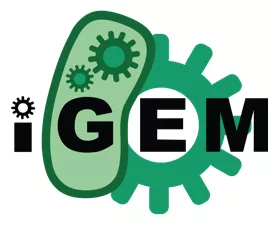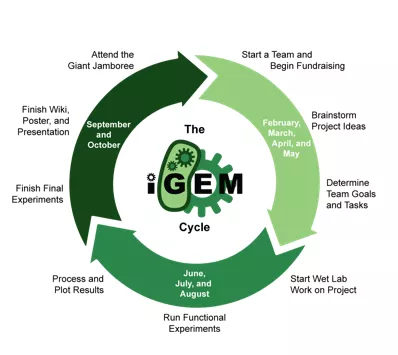The iGEM (International Genetically Engineered Machine) Foundation is a non-profit organization dedicated to supporting Synthetic Biology. As part of their mission, the iGEM Foundation organizes three initiatives:
- Registry of Standard Biological Parts - An open access repository of standardized DNA parts for use in the creation of devices. These parts are available to academic, nonprofit and community labs.
- iGEM Competition (aka the Giant Jamboree) - An annual synthetic biology event geared towards undergraduate university students, as well as high school and graduate students. Multidisciplinary teams from all over the world work to design, build, and test a biological machine created to address a societal need.
- After iGEM – A mentoring and advocacy program created to support the more than 40,000 iGEM alumni in their future endeavors in synthetic biology and beyond.
The iGEM Competition Cycle
iGEM teams typically follow the iGEM cycle (shown above). Teams identify a need they are passionate about with social, economic, environmental or health significance, and then plan a design for a synthetic organism which would address this need. Teams then work to build the organism using standard parts provided by iGEM through the parts registry, and often create new parts which will be added to the registry. Once a device or system is introduced into a chassis (a host microorganism), the function of the synthetic organism is then tested, and a series of refinements may be made to ensure utility.
In addition to building and testing a synthetic organism, student teams are encouraged to extend their research beyond the engineering. Teams work to investigate the human practices that surround their selected problem, engage in educational outreach about issues related to their project or the field of synthetic biology, or create a business plan for marketing their devices. Teams may also elect to use scientific processes to expand their project, such as performing mathematical and/or computer modeling, building hardware devices, or creating software.
At the annual competition, each team produces a set of deliverables, which must be submitted by strict deadlines. For the 2024 competition these include safety, judging, and attribution forms, a 15-minute presentation video, a team booth and public presentation at the Jamboree, a wiki documenting all aspects of the project, and a 2-minute advertisement video. Each team's competition materials undergo extensive evaluation by a panel of judges with expertise in an array of fields related to synthetic biology. Judges award medals based on a team's completion of medal criteria. In addition, special prizes are awarded to the teams which excelled in any facet of their project (e.g., best wiki, best human practices, best new part, best software tool).

